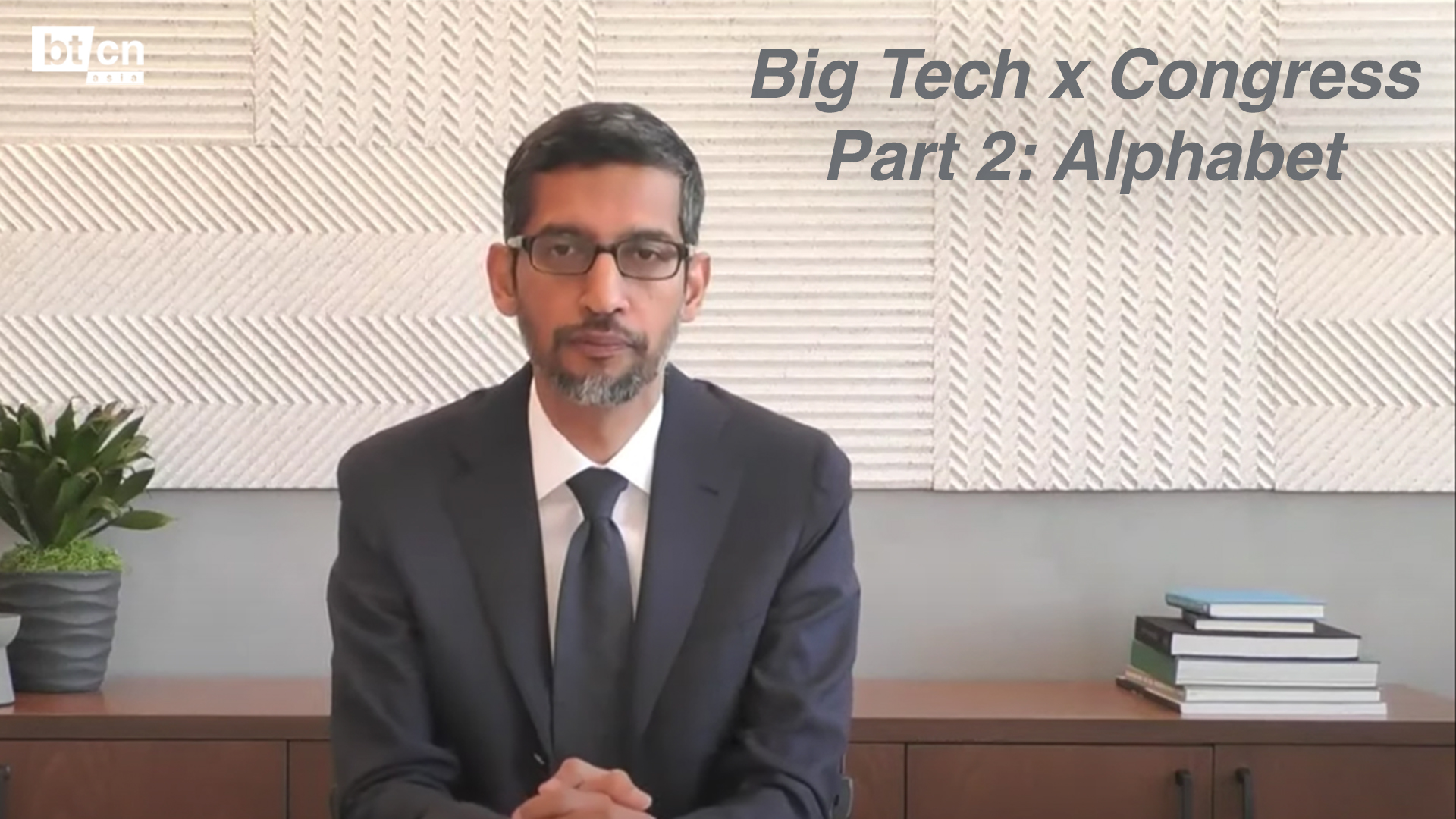Among the Big Tech heads testifying before Congress last Wednesday, Sundar Pichai was specifically notable on two accounts. He arguably has the lowest profile among any of the four CEOs. He also faced the most unexpectedly aggressive questioning, ranging from the expected antitrust issues, to partisan accusations of censorship, to broader questions of national security.
To help give some context to Alphabet’s positioning leading into last Wednesday’s hearing:
CEO: Sundar Pichai
Market Cap: $1.014 trillion (or more)
During Covid: Increased in value more than $245 billion since 20 March 2020
Biggest Issues
There’s many. Almost all of which stem directly from Google controlling 92% of all online searches, with its nearest competitors Bing (2.6%) and Yahoo (1.6%) registering only a fraction of global search traffic. And the implications Congress argues that has, on one hand for Google’s algorithms favouring particular content whether it’s products or information over others and thus control the flow of the internet itself; while a number of vocal, Republican committee members use the same logic to assert much more narrowly what they perceive as Google favouring liberal content over conservative content – a claim that’s widely made, but as-yet completely unproven.
It’s worth noting here that Sundar Pichai was officially speaking as CEO of Alphabet, but for all intents and purposes Congress views Alphabet and Google as the same thing, despite any semantics wrapped up in the various entities’ stock listings or earnings reports.
Alphabet in a Single Stat
Google’s market share makes it by far the largest digital ad platform. In 2019 Google accounted for 31.6% of all online advertising spend, followed by Facebook (22.7%), Amazon (7.8%) respectively, according to Insider Intelligence’s June report. A stat which if boiled down, on its surface means Facebook, for instance makes more (revenue), out of less (relative) market share in its given industry. And which if unpacked even further seems to indicate that volume of traffic in web searches is less directly valuable in terms of ad revenue yield, than on social media.
That interesting fact aside, a deeper reading ultimately raises the much bigger question – what’s more important in making a monopoly in a given industry?
Is it based purely on a sheer number of anecdotal eyeballs? Or is it more accurate to base it on revenue dominance as a function of its market share? Moving on from that, how do we quantitively measure if a particular company is directly controlling too much of the generic flow of general information (i.e. the sum total of news, opinions, recommendations, etc.), that constitute the basis for society’s perceived freedom of choice, online? We probably all agree that theoretically a monopoly can exist in many different forms: dominance in technology, access to customers, unfairly controlling prices, etc. So what’s more important in making a monopoly? Is it based purely on its sheer number of consumers? Or is it more accurate to base it on revenue as a function of its market share? If so, then how do you measure that in the case of Alphabet for instance?
And that speaks directly to the open question of Alphabet’s market dominance vis-a-vis its sheer, market cap value vs. any of its direct competitors. Simply put, what’s Alphabet worth? We’re not exactly sure. It passed the US$1trillion mark in mid-January, while many of its properties have never publicly declared financials, eg. Alphabet’s never detailed its other, best-known subsidiary’s performance – Youtube, despite SEC requests. Youtube’s earnings are bundled into Google’s. The same holds true for Google’s other core businesses – like Google Pay; or in the case of Google Cloud, which has only ever publicly declared earnings milestones twice (in 2018 and 2019).
Elephant in the Room
Also at issue (again, it seems) was Google’s decision to withdraw from working on another Pentagon project – in this case developing AI to analyse drone footage. Due to it conflicting with Google’s stated policies on what AI it will and won’t be party to developing (e.g. weaponised AI, etc.), and the related employee protests that sparked.
A decision on its surface that most of us prior to now, probably assumed would be left to market forces to judge the rationale of, but is now seen through a far more focused lens of national security. And specifically, raises the question of the legitimacy of government-sector expectations on private-sector entities – almost a case of noblesse oblige on the part of Big Tech supporting the Pentagon in key areas. With Republicans Ken Buck and Matt Gaetz questioning Google’s perceived rebuff of the Pentagon, while asserting Google continues to operate an AI lab in China (with the assumed danger of forced IP/technology transfer to the Chinese government that could imply) – an accusation which Pichai flatly denied.
Alphabet’s position in a quote
“A competitive digital ad marketplace gives publishers and advertisers, and therefore consumers, an enormous amount of choice… competition in ads — from Twitter, Instagram, Comcast and others — has helped lower online advertising costs by 40% over the last 10 years, with these saving passed down to consumers through lower prices.”
Reading between the lines
We obviously can’t know Pichai’s inner thoughts. Depending on your read, it may either be that Google and Alphabet are simply letting the market decide – and the market’s chosen. Or they’re indirectly divesting the outcomes of Alphabet’s market-dominant position into a case of trickle-down economics. It’s anyone’s guess which, if either it could be?
Congress’s position in a quote
Sub-Committee Chair Rhode Island Democrat, David Cicilline, asserted: “The evidence seems very clear… As Google became the gateway to the Internet, it began to abuse its power… It used its surveillance over Web traffic to begin to identify competitive threats and crush them. It has dampened innovation and new business growth, and it has dramatically increased the price of accessing users on the Internet, virtually ensuring that any business that wants to be found on the Web must pay Google a tax.”
Bluntly asking, “Why does Google steal content from honest businesses?”







